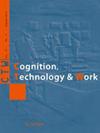Community health workers' non-technical skills for delivering primary healthcare in low-income areas.
IF 3.4
3区 工程技术
Q2 ENGINEERING, INDUSTRIAL
引用次数: 1
Abstract
BACKGROUND To overcome the poor conditions of low-income areas in developing countries like Brazil, Community Health Workers (CHWs) are required to exceed the regular set of formal skills they are used to employ. OBJECTIVE In this study, we aim at identifying the non-technical skills CHWs must develop to cope with the extraordinary situations that occur in vulnerable communities. METHODS 41 CHWs based in two primary healthcare clinics in Brazil underwent two rounds of in-depth interviews. The analysis was carried out using the Analytical Hierarchy Process, resulting in the prioritization of social skills according to their calculated importance to house calls. RESULTS Among the ten higher-scored skills, we find communication and advocacy skills being of high importance. Civility was found to be the most important attribute, confirming that community action relies strongly on the relationship between health professionals and the community. CONCLUSION The results of our study contribute primarily to the improvement of community-based primary care programs as it helps to identify major skills required for community action.社区卫生工作者在低收入地区提供初级卫生保健的非技术技能。
背景:为了克服巴西等发展中国家低收入地区的恶劣条件,要求社区卫生工作者(chw)掌握的正规技能超出他们所使用的常规技能。目的在本研究中,我们旨在确定卫生工作者必须发展的非技术技能,以应对弱势社区发生的特殊情况。方法41对巴西两家初级卫生保健诊所的chw进行了两轮深入访谈。该分析采用了层次分析法,根据社交技能对出诊的重要性计算出了社交技能的优先级。结果在10项得分较高的技能中,我们发现沟通和倡导技能非常重要。研究发现,文明是最重要的属性,这证实了社区行动在很大程度上依赖于卫生专业人员与社区之间的关系。我们的研究结果主要有助于改善社区初级保健计划,因为它有助于确定社区行动所需的主要技能。
本文章由计算机程序翻译,如有差异,请以英文原文为准。
求助全文
约1分钟内获得全文
求助全文
来源期刊

Cognition Technology & Work
ENGINEERING, INDUSTRIAL-
CiteScore
6.90
自引率
7.70%
发文量
26
审稿时长
>12 weeks
期刊介绍:
Cognition, Technology & Work focuses on the practical issues of human interaction with technology within the context of work and, in particular, how human cognition affects, and is affected by, work and working conditions.
The aim is to publish research that normally resides on the borderline between people, technology, and organisations. Including how people use information technology, how experience and expertise develop through work, and how incidents and accidents are due to the interaction between individual, technical and organisational factors.
The target is thus the study of people at work from a cognitive systems engineering and socio-technical systems perspective.
The most relevant working contexts of interest to CTW are those where the impact of modern technologies on people at work is particularly important for the users involved as well as for the effects on the environment and plants. Modern society has come to depend on the safe and efficient functioning of a multitude of technological systems as diverse as industrial production, transportation, communication, supply of energy, information and materials, health and finance.
 求助内容:
求助内容: 应助结果提醒方式:
应助结果提醒方式:


